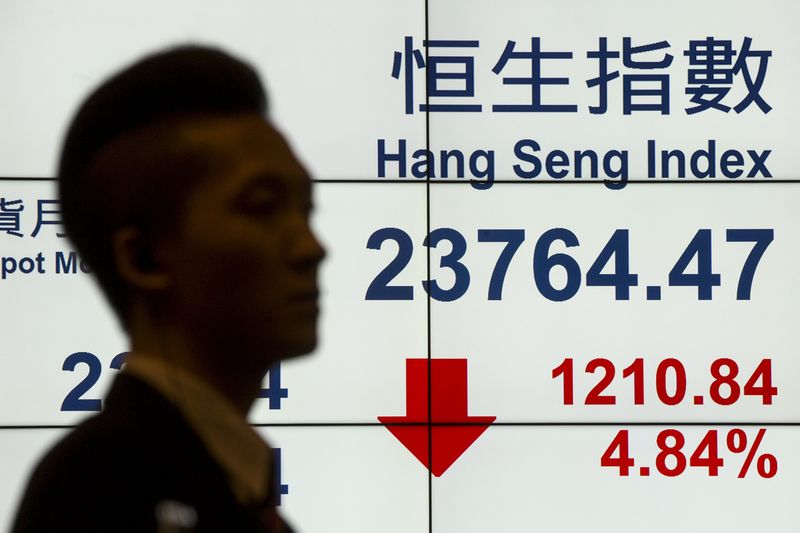Investing.com-- Most Asian stocks fell on Friday, cooling after marking some strong gains earlier this week, while Chinese technology stocks clocked steep losses after Alibaba flagged the impact of recent U.S. chip export curbs.
Regional markets took a weak lead-in from Wall Street, as the tail end of a fairly sobering earnings season brought little cheer. Weaker-than-expected jobless claims data also pointed to more cooling in the U.S. economy.
An overnight spike in U.S. Treasury yields also pressured stock markets.
Chinese tech, Hong Kong stocks battered by Alibaba
Hong Kong’s Hang Seng index was by far the worst performer on Friday, down 1.6% on heavy losses in locally-listed Chinese tech stocks.
Alibaba Group (HK:9988) (NYSE:BABA) slid 10% to a one-year low and was the biggest decliner on the index, after the e-commerce giant scrapped the planned spin-off and listing of its cloud unit.
The firm cited uncertainties over the supply of chips needed for artificial intelligence development, after the U.S. recently tightened its chip export ban against China to cover AI-related materials.
Alibaba’s move highlighted a similar issue for other Chinese firms, as they now face the challenge of developing AI without the cutting-edge technology provided by U.S. firms, specifically Nvidia (NASDAQ:NVDA).
Baidu Inc (HK:9888) (NASDAQ:BIDU) and Tencent Holdings Ltd (HK:0700), which together with Alibaba make up the BAT (LON:BATS) trio, sank 5.4% and 1.7%, respectively. Tencent had also warned of similar difficulties as Alibaba earlier this week.
Losses in domestic tech stocks saw China’s Shanghai Shenzhen CSI 300 and Shanghai Composite indexes fall 0.5% and 0.3%, respectively.
High-level talks between U.S. and Chinese leaders yielded little support for markets. While the countries agreed to reopen military communications, U.S. President Joe Biden referred to his Chinese counterpart Xi Jinping as a “dictator,” somewhat putting a dampener on sentiment over their meeting.
Weakness in China tech spilled over into other markets. South Korea’s KOSPI sank 0.7%, while Australia’s ASX 200 fell slightly.
Futures for India’s Nifty 50 index pointed to a slightly weaker open.
Japan’s Nikkei 225 was flat as Bank of Japan Governor Kazuo Ueda stressed on the need for ultra-loose policy, especially after data earlier this week showed that Japan’s economy shrank much more than expected in the third quarter.
But despite the weak economic signals, the Nikkei was set to add 2.7% this week- its third straight week in black. The prospect of a dovish BOJ kept investors largely bullish on Japanese stocks.
Most other Asian markets were also set for weekly gains, having rallied sharply on the back of softer-than-expected U.S. inflation data, which ramped up bets that the Federal Reserve will not hike interest rates further.
But markets remained uncertain over when the bank will begin trimming rates.
